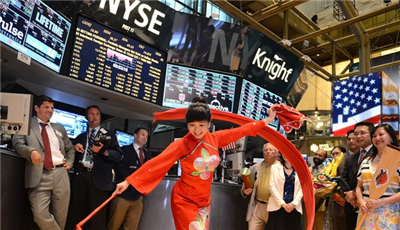(单词翻译:单击)
China is finalising plans to let individuals invest directly in overseas financial assets, further loosening capital controls as it seeks official reserve currency status for the renminbi.
中国政府进一步放松资本管制的计划即将拉开帷幕,这一计划将允许个人直接投资海外金融资产,旨在为人民币寻求官方储备货币地位。
The currency, once so tightly controlled that overseas visitors were restricted to parallel bank notes, is today freely convertible for trade purposes but strictly curbed on cross-border investment. That too is changing via a series of programmes to encourage freer capital flows, even as recent data indicate the country is grappling with record capital outflows.
人民币曾受到严格控制,海外游客仅限使用外汇券,如今虽可以基于交易目的自由兑换货币,但跨境投资仍受严格遏制。但这一点也将通过一系列程序加以改变,以鼓励更自由的资本流动,虽然最近的数据表明中国正努力应对创纪录的资本外流现象。

Easing controls on outbound financial investment will help the renminbi meet International Monetary Fund requirements that any official reserve currency be “freely usable”, analysts say. The IMF will decide this year whether to endorse the renminbi.
分析人士表示,放宽对海外金融投资的控制将有助于人民币满足国际货币基金组织(IMF)的要求,即任何官方储备货币都“可自由使用”。IMF将在今年决定是否接纳人民币。
The latest move would enable Chinese individuals to buy overseas stocks, bonds and real estate directly rather than pick from a handful of government-approved foreign mutual funds as they are now obliged to do, state media reported this week.
根据中国官方媒体本周报道,中国政府这一最新的举措将允许个人直接购买海外股票、债券和房地产,而不是像现在只能从少数政府批准的外国共同基金中挑选投资对象。
Known as the Qualified Domestic Individual Investor programme, or QDII2, it builds on an earlier 2007 incarnation that allows approved Chinese asset managers to sell mutual funds, comprised of foreign stocks and bonds, to domestic investors. Quotas granted under QDII totalled $90bn to the end of April.
这项名为合格境内个人投资者计划(QDII2)的举措是以2007年出台的合格境内机构投资者计划(QDII)为基础。QDII允许获批的中国资产管理公司向国内投资者销售投资海外股票和债券的共同基金。截至今年4月底,累计发放的QDII额度为900亿美元。
Apart from QDII, current rules let Chinese residents convert $50,000 worth of renminbi to foreign currency annually. In reality, investors have also exploited various loopholes to move money offshore, including disguising outbound financial flows as payments for imported goods.
除了QDII以外,现行法规允许中国居民每年将价值5万美元的人民币兑换为外币。事实上,投资者还利用多种漏洞将更多资金转移到海外,包括将出境资金流伪装成对进口产品的支付款。
QDII2 will start as a pilot programme in Shanghai, Tianjin, Chongqing, Wuhan, Shenzhen, and Wenzhou, the official Securities Times reported this week. Individuals with net financial assets of at least Rmb1m ($163,000) will qualify for the programme, with total outbound investment limited to 50 per cent of the individual’s net assets.
据官方媒体《证券时报》(Securities Times)报道,QDII2将作为试点项目在上海、天津、重庆、武汉、深圳和温州启动。净金融资产至少达到100万元人民币(合16.3万美元)的个人投资者才能达到参加该项目的资质要求,总对外投资额限制在个人净资产的50%以下。
Liang Hong, economist at China International Capital Corp, estimates that if the programme were expanded nationwide, it would theoretically free up about Rmb41tn in domestic wealth for overseas investment. But analysts caution that Chinese authorities, wary of unleashing uncontrolled outflows, are unlikely to scale the programme up that quickly.
中金公司(CICC)的经济学家梁红预测,如果该项目在全国推广,理论上将释放出约41万亿元人民币可用于海外投资的国内财富。但分析师警告称中国当局对放开不受控制的资金外流非常警惕,不太可能迅速扩大项目规模。
QDII2 will permit investment in stocks, bonds, mutual funds, insurance, financial derivatives and real estate. It will also permit direct investment, including mergers and acquisitions, the paper reported.
QDII2将允许对股票、债券、共同基金、保险、金融衍生品和房地产进行投资。据《证券时报》报道,该项目也允许包括并购在内的直接投资。


